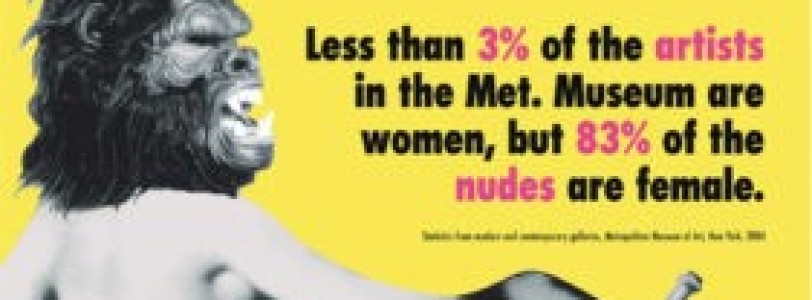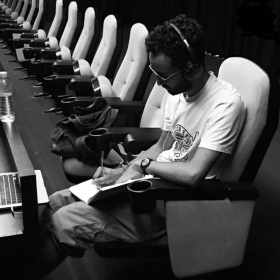It is known that every skill you acquire doubles your odds of success but in a world full of creative women their skill may not be the only thing under scrutiny.
In the summer I viewed the Guerrilla Girls and Andy Warhol exhibition in the Tate, which I have discussed in detail in my portfolio, the piece that changed my thoughts on the creative industry more than anything has before was the piece entitled “Do Women Have to be Naked to get into the Met?” This, as well as the other bold, feminist posters, created the internal debate: do women have it tougher in the Arts Industry?
A few clicks and words typed into google and thousands of results came up to do with this topic, especially with recent events such as the Me Too and Time’s Up movement and all the awards ceremonies like the Oscars and the Golden Globes. Although many of these problems are being voiced in the limelight, especially with the increase of sexual misconduct allegations brought into the media last year, some issues aren’t as globally discussed and are still going partially unnoticed.
Every year since 1986, the Les Victoires du Jazz Awards selects France’s best jazz musician. In 2017 all the nominees in all the categories were men. Though a smaller issue, it is still something which should be discussed. 66-year-old veteran French bass player Joelle Leandre wrote in an open letter “How is it possible that in the 21st Century again and again not a single woman is nominated?” The letter opens with “Dear Sirs”; a bold and very unapologetic nudge towards men in high power positions with the ability to create change. Jazz has always been about taking risks and has served as a fundamental voice against racial and social discrimination. However women in Jazz, and in the music industry altogether, have been relegated to very specific roles, or in some cases disregarded completely.
In terms of Classical music, women are underrepresented in many positions including leadership roles. In an interview for The Telegraph, Mariss Jansons, a Latvian conductor, was asked how he felt about “the biggest change in the conducting scene”- being the increase in female conductors. Jansons said “Well I don’t want to give offence and I’m not against it that would be very wrong. I understand the world has changed, and there is now no profession that can be confined to this or that gender. It’s a question of what one is used to, I grew up in a different world, and for me seeing a woman on the podium… well, let’s just say it’s not my cup of tea”. If a lot of people have this same mindset it seems like change is something which will be difficult to achieve. With something as traditional as classical music it is easy, however not tolerable, to see why many would complain about women taking their roles, roles that have been previously strictly male for centuries.
Gender inequality can be seen throughout the arts industry, and in 2015 Shoshana Greenberg wrote that “Broadway can be a disheartening place for women. Too few are represented as writers and directors, and women’s stories don’t often make it to the stage.” However, an infographic created by HowlRound shows that there’s not only a lack of women in the position of a director, playwright or protagonist but also in other behind-the-scenes positions. In fact, the stats show that in the design roles (say scenic, lighting, and sound) women lag behind men. Greatly. The most drastic discrepancy is in sound design, where women filled only 8.8% of positions over five seasons, while men held 91.2%. Although interestingly enough, in costume design the women outnumber the men- 68.7% against 31.3% - it seems gender in jobs can’t ever be balanced.
Sarah Crompton in an article entitled ‘Sexism on the Stage’ says “there is a general feeling among female playwrights that their gender means their work is viewed differently – by audiences and more noticeably by critics. Sometimes, they feel that altered gaze costs them a star in the ratings; on other occasions, the bias is more subtle- perhaps just a mention of the author's gender or age in a review. But whatever its manifestation, there is a sense that the playing field is not level.” Some artists are trying to tackle this problem; director Katie Mitchell created the play ‘Ophelias Zimmer’ which she describes as “radical, extreme work”. The play takes a different view of Hamlet’s Ophelia, a character who in Shakespeare’s world would be seen as minor and unimpressive when compared to the main hero. Although described in an article published by the Telegraph as “a far-flung feminist take” Mitchell succeeded in producing a popular play which got a lot of media coverage. I’ve often heard in heated debates that feminist plays or films only gain admiration and attention because it’s a large feat that a woman has created something and got it out there into the public, instead of how it really should be viewed; as either a good piece of art or a bad one. To an extent I agree with this, in the TV and Film industry for example, it is common to see a woman being celebrated if they break into the top-selling films however if it flops, fans generally take bad reviews as an attack on the female gender when in matter of fact it’s often just an attack on the creators skills. Not that I am saying that a woman doing these things shouldn’t be celebrated, it’s more that these popular art pieces aren’t allowed to be viewed negatively due to the hard work of the creator. I’m a big believer in freedom of speech even if that includes opinions that I don’t particularly agree with or want to hear.
Another role model, Zinnie Harris, an award-winning British playwright and Director says on the subject “But isn’t that the point of art? That we are trying to do something? Of course, you are entitled not to like it, but don’t condemn or destroy someone’s career because they have tried…There is something about a woman who raises her voice in public that is difficult for us as a society.” As you can probably tell I am very conflicted. I do believe that women have to be better represented in the Arts Industry, obviously as someone who wants to go into it, however, I don’t agree that businesses should hire women who may have no talent just because the business wants to have a balanced amount of men and women. Quality and skill has to be always fairly judged, although it may not have been in the past. I do believe that there are many women who aren’t getting the appreciation they deserve entirely due to their gender but this argument is a very difficult one as the problem is extremely large and I in no way feel I can appropriately and correctly discuss this issue.
There’s a large tornado of feminism wiping through the media nowadays and I think change is on its way if not, happening as we speak. As Sarah Crompton says: “There is something in the air when it comes to women asserting their cultural importance- whether it be the fact that the true hero of Star Wars: The Force Awakens is Rey, a woman who doesn’t need a man to protect her, or that Charles Saatchi for the first time has an exhibition that features only women artists (although one shouldn’t consider Saatchi a feminist). People protested on social media when the Abbey Theatre in Dublin announced a season that features only one play by a woman and they cheered when Jennifer Lawrence took up the baton for equal pay in Hollywood.” With the rise of women speaking up about issues they face, which I think you can agree are large issues, I think the only way is forward.










This article really made me realise how an industry that I thought to be stereotypically dominated by women, is in fact ruled by men. This is especially true since the majority of painters that I know are male.